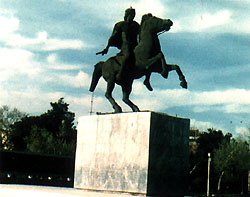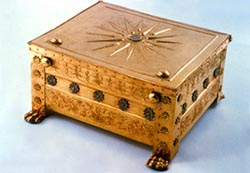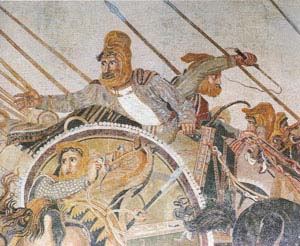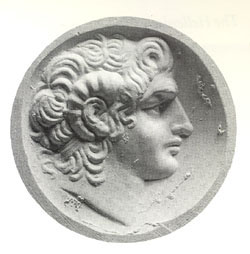
|
Greek-American Groups Lobby, Educate About Macedonian History |
In 1991, after the dissolution of the Socialist Federal Republic of Yugoslavia, the southernmost republic declared itself independent and sought international recognition under the name Republic of Macedonia. Because Greece launched vociferous objection in the UN to this use of the name, for reasons which will be discussed more fully below, the UN voted voted to accept the country as a new member with the temporary name of Former Yugoslav Republic of Macedonia, while enjoining the two member states to work out their differences. Although Greece has offered numerous alternatives, the name dispute remains unresolved. And it is not the only dispute separating these two neighboring countries. Additionally, conflict arose over the creation of a FYROM state flag incorporating the Star of Vergina, the issuing of currency with the White Tower of Thessaloniki, and articles of the new constitution implying a right to all lands of ancient Macedonia. The two symbols have been recognized worldwide as symbols of Greek history and culture; the star having been unearthed in northern Greece at excavations in
At issue for the Greek groups is the apparent usurping of the history of the Greek province of Macedonia by FYROMians, with more subtle fears of expansionist claims on Greek territory. The majority of the scholarly world, Greeks claim, recognizes the Greek nature of the ancient inhabitants of the province of Macedonia, particularly of its most famous son, Alexander the Great. Although the FYROMians have waged a vehement anti-Greek campaign, lining up a few scholars of international reputation, most notably Ernst Badian and Eugene Borza, the preponderance of international sentiment toward Alexander the Great appears to line up with the Greek view. FYROMians assert that the ancient Greeks did not consider the Macedonians as Greeks, using the oft-cited passage from Thucydides as concrete evidence (2.80.82), along with passages from other Greek and Roman sources. A plethora of Greek and international experts cite most of the same passages -- interestingly enough -- adding even others from ancient historians, including Thucydides, Arrian, Polybius, Titus Livius, and Herodotus, a contemporary with Alexander, who demonstrate unambiguously that the Macedonians are Greeks. See Nystazopoulou-Pelekidou, "The Macedonian Question. A[n] Historical Review," for a fine discussion of these sources among ancient historians and writers (http://www.hri.org/docs/macque). Indeed, the only extant inscriptions recovered from that part of the world are in Greek. So why the continuing controversy? Why do scholars like Badian and others continue to insist that the ancient Macedonians were not Greek? FYROMians refuse to accept archaeological evidence that continues to amass in favor of the Greek position, namely that ancient Macedonians were essentially Greek. Inscriptions continue to be unearthed—all in Greek, none in the so-called Macedonian language. FYROMians publish Internet position papers incessantly and insist on selectively quoting snippets of Borza and Badian (See especially http://faq.macedonia.org/history/ancient.macedonia/ethnicity.html) and stating unsupportable conclusions. Everywhere on these sites there is prima facie evidence of an intractable refusal to accept
The issue becomes increasingly complex because of modern politics. Intertwined -- almost inextricably -- is the modern history of the entire Balkan peninsula. At one time the present Greek province of Macedonia was dominated by the Ottoman Turks, as were nearly all other areas of the Balkans. With the dissolution of the Ottoman empire and the concurrent rise of nationalism in the Balkans early in the 1900s, particularly after the Balkan Wars and World War I, parts of the Balkans were ceded to Bulgaria, Greece, and Serbia through treaties with Turkey and with each other. As part of the treaties, there were mutual exchanges of some populations. Immediately following these devastating wars, communism gained a foothold, bringing some of these countries solidly under totalitarian control and leading others, like Greece, into civil war several decades later. Communist regimes developed and promulgated a Macedonian identity and language for these Slav-speaking peoples, creating a national consciousness and developing a cultural buttress to thwart potential Albanian and Bulgarian designs upon their territory. But the propaganda didn't end with the development of a Macedonian identity. Communist textbooks clearly taught what the leaders wanted the people to believe, that they had a right to all lands considered Macedonian, i.e., the Greek province of Macedonia and lands under control of other governments—a greater Macedonia. Other governments took note and expressed apprehension in circulars; the US Secretary of State E. Stettinius, wrote (U.S. State Dep. Foreign Relations Vol. VII, Circular Airgram [868.014], December 26, 1944) that the desire on the part of Tito to create a separate Macedonia was a "cloak for aggression against Greece." The State Department clearly indicated that talk of "Macedonian Nation," "Macedonian Fatherland," or "Macedonian National Consciousness" was nothing other than unjustified demagoguery representing no ethnic or political reality a After the downfall of communism in Eastern Europe, Russia, and Albania, the concept of a Greater Macedonia continued to be nurtured. When Yugoslavia dissolved and FYROM declared independence, FYROMians reasserted the ideas of a Greater Macedonia. In the initial years of the republic (FYROM), the usurpation of Greek national symbols for currency and flag, along with the adoption of the same name as a Greek province, long coveted by totalitarian leaders, set the tone for conflict with neighboring Greece. In international negotiations and meetings among EU countries and the UN, Greece has steadfastly refused to recognize any new name for the fledgling country bearing the word "Macedonia," FYROMians have leveled countercharges against the Greeks, claiming that they have oppressed the human rights of a minority group within their borders, namely the Slav-speaking Greeks of northern areas, and that Macedonia isn't Greek, among others. Although minority rights is a separate—and equally thorny issue--rising concern over the stability of this tiny country, however, has led Greece to offer close alternatives, including a compound name with the word "Macedonia." Bulgarians, on the other hand, maintain that the current "Macedonian" language is nothing more than a dialect of Bulgarian because of its linguistic similarity; the FYROMians, they conclude, are really Bulgarians. Responses to these claims cite the interest of Bulgaria in the past to annex FYROM and portions of northern Greece, once part of a medieval greater Bulgarian kingdom, as the underlying reasons for such statements. Despite serious differences with all of her neighbors, the actual stability of FYROM is threatened only by ethnic Albanian guerrillas and terrorists. A minority of the population of FYROM, about 30%, is made up of Albanians, some of whom support armed insurgency. The violence is strikingly reminiscent of other areas of the Balkans in the last few decades in which Muslim extremists, often referred to in the news media as "ethnics," seek to undermine governing
As the Greek-American groups lobby to preserve the accuracy of the historical record with respect to the history of the Greek province of Macedonia, they concurrently are waging an educational campaign to counteract the explosion of misinformation appearing on the Internet. For example, on one webpage maintained by the Macedonian Information and Liaison Service, the Independent MILS News (http://groups.yahoo.com/group/balkanhr/message/5110) the following title looms over the diatribe, "Three American States Renamed the Macedonians into Greeks." The authors state that the Macedonians are insulted "because it denies their ethnical integrity, and by that violates their human rights." On another site of the Cultural Heritage of Macedonia (http://www.macedonia.co.uk/mcic/aboutmacedonia/language/language.asp) under the heading "The Macedonian Language," visitors read "Ancient Macedonian, an independent Indo-European language of uncertain affiliation was spoken in at least part of Macedonia in the fifth and fourth centuries BC and presumably both earlier and later. This gave way to Greek, which was in turn supplanted by Slavonic when the Slavs invaded and settled in the sixth and seventh centuries AD." Yet another persists with inflammatory language and accusations: "Why is Greece Stealing Macedonian History?" and "The Greek Lies" (http://faq.macedonia.org/history/ancient.macedonia/ethnicity.html). Yet, not all sites which generally appear pro-FYROMian fully support all of their positions. One such site (http://www.macedonia.co.uk/mcic/aboutmacedonia/culturalheritage/culther.asp) titled "The Cultural Heritage of Macedonia" indicates that there is no medieval-era written Macedonian, again refuting claims of a long-standing Macedonian heritage: "The medieval Slavonic literature is the oldest in the culture to which the Macedonians belong and is the common source of the literature of all Slavonic people." More importantly, another pro-FYROMian site (http://www.maknews.com/articles/rossos1.html) clearly attributes the rise of the Macedonian Question to communism: ". . . the association of Macedonian nationalism with international communism—led to a revival of the Macedonian question as the central issue dividing the Balkan states and hence as the major cause of instability in southeastern Europe." The significance of this statement is that through the last few centuries there was never a Macedonian national consciousness; in other words, Macedonia as a separate identity, culture, and language never existed in history as did an ethnic and cultural identity for Greeks and Bulgarians and Serbs. Communist leaders, then, fabricated a Macedonian identity to serve their political aims. It goes without argument that Greece and her neighbors are really not directly threatened by such a tiny country, without resources and essential national defenses. And it is to Greece's credit for supporting FYROM economically by fostering business ties and nurturing developing businesses. But in light of the history of the Balkans during the last two decades, in light of the success of terrorist groups in redrawing boundaries and evening perceived old ethnic "scores," how can a reasonable person conclude that conflicts in this volatile region over names and national symbols are of no consequence? Of what interest are these issues to the average American or Greek-American? Here in the US democracy depends on a free and educated populace that has learned historical truth. Attempts at revisionism are staunchly rebuked. American states do and should proclaim resolutions refuting such efforts while "restating the fact that Macedonia is a Greek province and has been such since the origins of recorded history some 3,000 years ago," as Louisiana Sen. Lambert C. Boissier Jr. recently wrote. The senator from New Orleans added that this position taken by the Louisiana state senate was nothing usual, since it was "currently the official policy of the United States as well as that of the United Nations." Texas 6th District Senator Mario Gallegos echoed this position as he introduced a resolution into the legislature affirming that "the ancient Macedonians are Hellenes and that the inhabitants of the northern province of Greece, Macedonia, are their Hellenic Descendents. . .[and] the history of Ancient Macedonia has been Hellenic for 3,000 years and continues to be today." The resolution passed in April. That says it all. |
|




